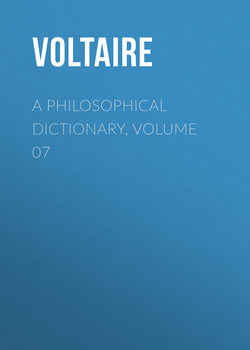Читать книгу A Philosophical Dictionary, Volume 07 - Voltaire, Вольтер - Страница 4
JUST AND UNJUST
ОглавлениеWho has given us the perception of just and unjust? God, who gave us a brain and a heart. But when does our reason inform us that there are such things as vice and virtue? Just at the same time it teaches us that two and two make four. There is no innate knowledge, for the same reason that there is no tree that bears leaves and fruit when it first starts above the earth. There is nothing innate, or fully developed in the first instance; but – we repeat here what we have often said – God causes us to be born with organs, which, as they grow and become unfolded, make us feel all that is necessary for our species to feel, for the conservation of that species.
How is this continual mystery performed? Tell me, ye yellow inhabitants of the Isles of Sunda, ye black Africans, ye beardless Indians; and you – Plato, Cicero, and Epictetus. You all equally feel that it is better to give the superfluity of your bread, your rice, or your manioc, to the poor man who meekly requests it, than to kill him or scoop his eyes out. It is evident to the whole world that a benefit is more honorable to the performer than an outrage, that gentleness is preferable to fury.
The only thing required, then, is to exercise our reason in discriminating the various shades of what is right and wrong. Good and evil are often neighbors; our passions confound them; who shall enlighten and direct us? Ourselves, when we are calm and undisturbed. Whoever has written on the subject of human duties, in all countries throughout the world, has written well, because he wrote with reason. All have said the same thing; Socrates and Epictetus, Confucius and Cicero, Marcus Antoninus and Amurath II. had the same morality.
We would repeat every day to the whole of the human race: Morality is uniform and invariable; it comes from God: dogmas are different; they come from ourselves.
Jesus never taught any metaphysical dogmas; He wrote no theological courses; He never said: I am consubstantial; I have two wills and two natures with only one person. He left for the Cordeliers and the Jacobins, who would appear twelve hundred years after Him, the delicate and difficult topic of argument, whether His mother was conceived in original sin. He never pronounced marriage to be the visible sign of a thing invisible; He never said a word about concomitant grace; He instituted neither monks nor inquisitors; He appointed nothing of what we see at the present day.
God had given the knowledge of just and unjust, right and wrong, throughout all the ages which preceded Christianity. God never changed nor can change. The constitution of our souls, our principles of reason and morality, will ever be the same. How is virtue promoted by theological distinctions, by dogmas founded on those distinctions, by persecutions founded on those dogmas? Nature, terrified and horror-struck at all these barbarous inventions, calls aloud to all men: Be just, and not persecuting sophists.
You read in the "Zend-Avesta," which is the summary of the laws of Zoroaster, this admirable maxim: "When it is doubtful whether the action you are about to perform is just or unjust, abstain from doing it." What legislator ever spoke better? We have not here the system of "probable opinions", invented by people who call themselves "the Society of Jesus".
